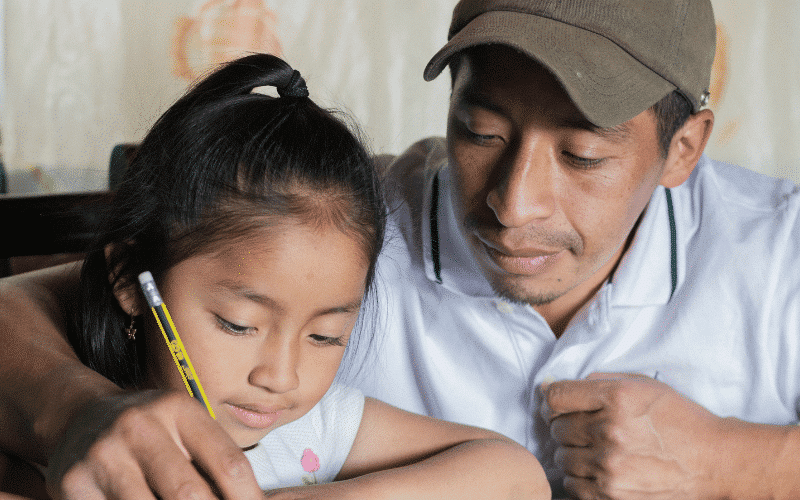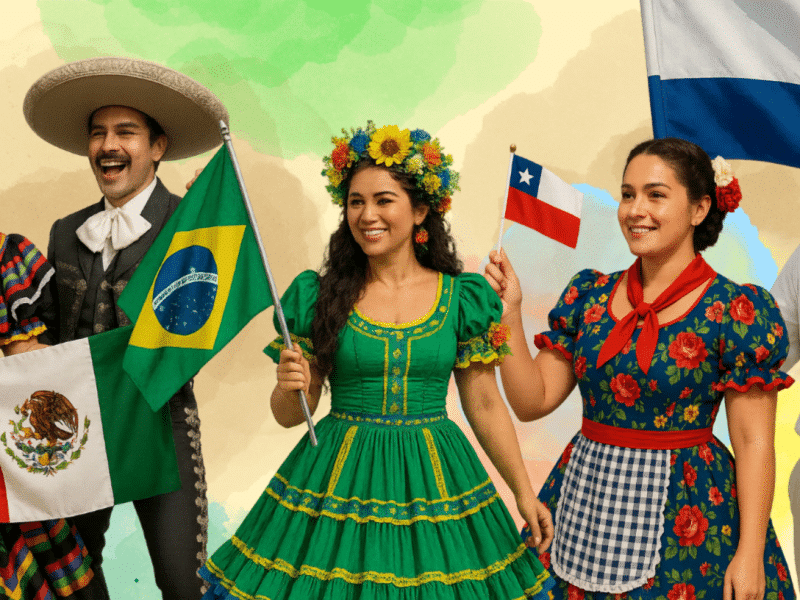The Redefinition of Latino Fatherhood: From Absence to Active Parenting
Machismo has cast a long shadow over the Latino community, shaping the beliefs and behaviors of many fathers. But change is possible, and it starts with fathers themselves.

As of 2024, there are about 3.52 million Latine families in the United States led by single mothers. This isn’t just a statistic; it’s the vivid reality of Latinas shouldering the responsibility of parenting without the active support of a co-parent figure.
Absent fatherhood in the Latino community touches everyone and contributes to cultural norms, expectations, and stereotypes.
For many, the historical passivity adopted by some generations towards absent fatherhood still resonates deeply in our cultural roots. The phrase “déjelo en manos de Dios, mija” has been passed down from generation to generation as a resigned comfort in the face of disconnected fathers. It’s the old, “boys will be boys” sentiment.
This leaves women to shoulder the burden of raising children on their own without much expectation of receiving help from the father. Latino culture often expects women to be unreasonably “strong” and capable of handling any situation that comes their way. A 2017 Census Bureau report found that 80% of all custodial parents were mothers, and of these custodial mothers, 56% of white mothers were awarded child support versus only 44% of Latinas, according to a 2016 review of child support claims.
Lower claims of child support are only one very limited way in which cultural self-sufficiency expectations manifest themselves. This can also lead to emotional isolation and extreme pressure to keep up. In the 2021 April/May issue of PARENTS LATINA, Ernestina Perez, a Mexican-American therapist and founder of Latinx Talk Therapy, stated, “There’s a lot of stigma around single motherhood in the Latino community because of traditional gender norms that view men as the protectors and financial providers, and women as the selfless, do-it-all caretakers.”
As culture continues to shift and outdated machista beliefs are dismantled, many different approaches to tackling absent fathers are being taken.
When fathers skip out on their financial responsibilities, it’s important that Latinas pursue a child support claim. Single moms don’t have to just grin and bear it. Latinas already face too many economic disparities, including consistently having the largest wage gap of all women, to have this add to the economic stress. In 2022, almost 30% of Latine single-mom families were struggling financially. When Latinas don’t pursue child support, it keeps fueling a poverty cycle and upholds unreasonable gender expectations.
Where are the Fathers? Why aren’t they Taking Responsibility?
In the Latine community, where old-school gender roles still have a say, patriarchal culture directly influences fatherhood expectations. It’s a common experience for young women to be kept at home under strict rules while young men are allowed to go out at their pleasure, without any sexual education or warnings to abstain from, or practice safe sex.
This adds to the lack of accountability when a man does end up impregnating a young girl or woman, while shifting the burden and “blame” to the young girl or woman for not heeding the warnings of their family.
Factors like migration also contribute to the splitting of families. From harsh immigration policies that regularly deport one or both parents to inhumane border security policies that continue to separate parents from their children, women are often left as sole caregivers of separated families.
Latino men are also experiencing a positive role model crisis. There’s been a downward trend of Latino men pursuing higher education, and the Latina versus Latino education gap continues to widen. Even as the number of Latinas/os attending college has steadily grown over the last few decades, the proportional representation of Latino men continues to slide in comparison to their Latina counterparts.
The stigma around seeking mental health support is more pronounced in men versus women, and it’s even worse in the Latino community. Research indicates that Latinas are more open to seeking support than Latino men, which leaves them attempting to deal with their challenges on their own. Not to mention that Latino men are also still facing the same issues that Latinas face: discrimination, disproportionate poverty, absent fathers, and cultural norms that teach them harmful behaviors.
The disproportionate absence of fathers in the Latino community is extremely complex and nuanced. The causes mentioned are only the tip of the iceberg in terms of fully understanding the nature of the problem, but even with this superficial understanding, some solutions can be identified.
How Can We Begin to Solve the Absent Father Problem?
Raising a New Generation of Empowered Children
Latina moms have the power to shift things for the better. Teaching our kids how to challenge concepts of toxic machismo and irresponsible behaviors is an essential task. This isn’t limited to moms; on the contrary, despite there being a disproportionate amount of single moms, there’s an even bigger number of families with active fathers, and they are taking on the responsibility of raising their kids differently than how they were raised.
Breaking Down Traditional Masculinity
As gender roles continue to shift across generations, ditching the old-school view of masculinity is gaining momentum. Both women and men are actively challenging the harmful notions that femininity and masculinity are traits that are limited to certain genders. Groups like Bloom Homi, which are led by Latino men, are actively working to change the expectations of Latino men and are working to build communities of support where men can feel supported as they participate in dismantling machismo.
Meanwhile, Latina-led parenting groups like Latinx Parenting are not only providing support for moms but also building an inclusive community that actively brings Latino dads into the fold, ensuring that there’s space for everyone who wants to learn how to disrupt harmful cycles of family dysfunction.
Changing Parenting Roles Through Public Policy
It’s no secret that parental leave in the U.S. is shamefully lacking compared to other comparable nations. Only 27% of U.S. workers have access to paid parental leave, and while under FMLA, families are entitled to at least 12 weeks of parental leave, all this does is guarantee that they won’t be fired from their jobs. If they decide to take family leave, it’s unpaid, and most families can’t afford to be unemployed for three months.
Even when paid parental leave is offered, paternity leave is even less accessible than maternity leave. New dads are still expected to fulfill the “breadwinner” role, while moms are left to fulfill their childbearing and child-caring role, despite a significant amount of research confirming the many positive effects paternal newborn bonding has on both the dad and the newborn.
Changing Media Narratives About Dads
The portrayal of dads in media has a massive impact on how they are expected to behave in real life. Studies have found that there are two main ways in which dads are portrayed in media. On one hand, men are rarely portrayed as nurturers and are relegated to the hard, cold, but steadfast stereotype of protector and provider. On the other, they are shown as incompetent, foolish, and emotionally disconnected parents, where competent, wise, emotionally connected mothers must often come to the rescue of those fathers.
Latino dads are portrayed even more negatively because of the severe lack of Latino representation in the media. There are so few roles for Latino men that they haven’t even made much of a dent in fatherhood portrayals, much less changing those roles to address machismo and reflect any positive change that’s occurring in Latino culture.
Just as it is imperative to change media portrayals of Latinas in media, the same has to be done for Latino men, especially as it relates to family gender roles and dynamics.
Supporting Community Spaces and Men’s Groups
No, we’re not talking about the incels who hate women and blame them for all their problems. We’re talking about the exact opposite.
Men’s groups are popping up all over the country and are a place where men and dads can swap stories, pick up tips, and have each other’s backs. Like any group, they all have their own dynamic and focus, and sometimes a few have to be tried until a good match is made, but accepting these groups as part of a healthy community is critical to getting men the support they need.
Digital communities like Bloom Homie, as well as organizations like the National Compadres Network, and their Fatherhood & Family Initiative are contributing to the ecosystem that’s helping to dismantle harmful narratives and also build community amongst men who want to break harmful patriarchal cycles.
While none of these solutions will produce instant improvements, they are all things that everyone of any gender can help implement. While it may not be easy to reduce the amount of absent fathers in Latino households, research shows that it’s attainable, and that alone makes it worth pursuing.




